Infections
Infections occur when harmful organisms (germs), such as bacteria, fungi and/or viruses, invade your body and multiply, resulting in disease, illness or damage to your organs and tissues.
Normally, your immune system destroys these harmful organisms before they can cause damage. However, because disease and its treatments weaken the immune system, it often cannot destroy the organisms fast enough, increasing the risk for infection.
Common disease-related causes of infection include:
- Cancers that directly affect the bone marrow, including leukemia and lymphoma
- Cancers that spread to the bone, disrupting the production of white blood cells
- Chemotherapy medications that lower the production of white blood cells
- Treatment side effects, such as stress, poor diet, sleeplessness and others, that weaken the overall function of the immune system
- Among people being treated with drug therapies, alone or in combination with other treatments, neutropenia is a common condition and can make the body more susceptible to infection (see Neutropenia, page 17, for ways you can help prevent infection).
When should you call your health care provider?
Report any of these symptoms immediately:
- Fever (oral temperature higher than 100.4 °F), chills and sweating
- Flu-like symptoms (body aches, general fatigue) with or without fever
- Cough, shortness of breath, painful breathing
- Sore throat or sores in your mouth
- Redness, pain or swelling on your skin
- Pus or drainage from any open cut or sore
- Diarrhea (loose or liquid stools)
- Pain or burning with urination
- Vaginal drainage or itching



